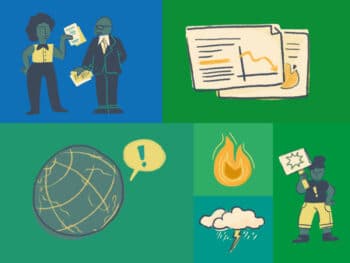Dear friends,
Greetings from the desk of Tricontinental: Institute for Social Research.
In November 2022, most member states of the United Nations (UN) will gather in the Egyptian resort city of Sharm El Sheikh for the annual UN Climate Change Conference. This is the 27th conference of the parties to assess the UN Framework Convention on Climate Change, commonly referred to as COP 27. The international environmental treaty was established in Rio de Janeiro in 1992, with the first conference held in Berlin in 1995; the agreements were extended in the Kyoto Protocol of 2005 and supplemented by the Paris Agreement of 2015. No more needs to be said of the climate catastrophe, which threatens mass species extinction. The move away from carbon-based fuel has been stalled by three main impediments:
- Right-wing forces which deny the existence of climate change.
- Sections of the energy industry which have a vested interest in the continuation of carbon-based fuel.
- Western countries’ refusal to admit that they remain principally responsible for the problem and to commit to repaying their climate debt by financing the energy transition in developing countries whose wealth they continue to siphon off.
In public debates over the climate catastrophe, there is barely any reference to the Rio Earth Summit of 1992 and the treaty that noted: ‘The global nature of climate change calls for the widest possible cooperation by all countries and their participation in an effective and appropriate international response, in accordance with their common but differentiated responsibilities and respective capabilities and their social and economic conditions’. The phrase ‘common but differentiated responsibilities’ is an acknowledgement of the fact that while the problem of climate change is common to all countries and none are immune to its deleterious impact, the responsibility of countries is not identical. Some countries—which have benefited from colonialism and carbon fuel for centuries—have a greater responsibility for the transition to a decarbonised energy system.

Roger Mortimer (Aotearoa/New Zealand), Whariwharangi, 2019.
The scholarship on the matter is clear: Western countries have benefited inordinately from both colonialism and carbon fuel to attain their level of development. The data from the Global Carbon Project, which was headed by the U.S. Department of Energy’s now defunct Carbon Dioxide Information Analysis Centre, shows that the United States has been far and away the largest producer of carbon dioxide emissions since 1750. By itself, the United States has emitted more CO2 than the entire European Union, twice as much as China, and eight times more than India. The main carbon emitters were all colonial powers, namely the U.S., Europe, Canada, and Australia, which, despite consisting of roughly one tenth of the global population, have together accounted for more than half of cumulative global emissions. From the 18th century on, these countries have not only dispensed the bulk of the carbon in the atmosphere, but they continue to exceed their share of the global carbon budget.
Carbon-fuelled capitalism, enriched by the wealth stolen through colonialism, has enabled the countries of Europe and North America to enhance the well-being of their populations and attain their relatively advanced level of development. The extreme inequalities between the standard of living for the average European (748 million people) and the average Indian (1.4 billion people) is seven times greater than it was a century ago. Though the reliance by China, India, and other developing countries on carbon, particularly coal, has risen to a high level, their per capita emissions continue to remain far below those of the United States, whose per capita emissions are close to twice that of China’s and eight times more than India’s. The lack of acknowledgment of climate imperialism leads to a failure to properly resource the Green Climate Fund, which was created in 2010 at COP 16 with the aim of helping developing countries ‘leapfrog’ carbon-fuelled social development.
 At the global level, debates on how to address the climate crisis frequently revolve around various forms of a Green New Deal (GND), such as the European Green Deal, the North American GND, and the Global GND, which are promoted by nation states, international organisations, and different sections of environmental movements. In order to better understand and strengthen this discussion, the Tricontinental: Institute for Social Research office in Buenos Aires, Argentina, gathered leading eco-socialist scholars to reflect on the different GNDs and the possibilities to realise a genuine transformation to stave off the climate catastrophe. That discussion—with José Seoane (Argentina), Thea Riofrancos (United States), and Sabrina Fernandes (Brazil)—is now available in notebook no. 3 (August 2022), The Socioenvironmental Crisis in Times of the Pandemic: Discussing a Green New Deal.
At the global level, debates on how to address the climate crisis frequently revolve around various forms of a Green New Deal (GND), such as the European Green Deal, the North American GND, and the Global GND, which are promoted by nation states, international organisations, and different sections of environmental movements. In order to better understand and strengthen this discussion, the Tricontinental: Institute for Social Research office in Buenos Aires, Argentina, gathered leading eco-socialist scholars to reflect on the different GNDs and the possibilities to realise a genuine transformation to stave off the climate catastrophe. That discussion—with José Seoane (Argentina), Thea Riofrancos (United States), and Sabrina Fernandes (Brazil)—is now available in notebook no. 3 (August 2022), The Socioenvironmental Crisis in Times of the Pandemic: Discussing a Green New Deal.
These three scholars argue that capitalism cannot solve the climate crisis since capitalism is the principal cause of the crisis. One hundred of the world’s largest corporations are responsible for 71% of global industrial greenhouse gases (largely carbon dioxide and methane); these corporations, led by the carbon energy industry, are not prepared to accelerate the energy transition, despite the technological capacity to generate eighteen times the global electricity demand by wind power alone. Sustainability, a word that has been emptied of its content in much public discourse, is not profitable for these corporations. A social renewable energy project, for example, would not produce vast profits for the fossil fuel companies. Interest from certain capitalist firms in the GND is substantially motivated by their desire to secure public funds to engineer new private monopolies for the same capitalist class that owns those large corporations that pollute the world. But, as Riofrancos explains in the notebook, ‘“Green capitalism” purports to mitigate the symptoms of capitalism—global warming, the mass extinction of species, the destruction of ecosystems—without transforming the model of accumulation and consumption that caused the climate crisis in the first place. It is a “techno-fix”: the fantasy of changing everything without changing anything’.

Gonzalo Ribero (Bolivia), Ancestor, 2016.
The mainstream discussion of GND emerges, as Seoane points out, from initiatives such as the 1989 Pearce report Blueprint for a Green Economy, which was prepared for the UK government and proposed the use of public funds to produce new technologies for private companies as a solution to the cascading crises in Western economies. The concept of the ‘green economy’ was not to green the economy, but to use the idea of environmentalism to revitalise capitalism. In 2009, during the world financial crisis, Edward Barbier, a co-author of the Pearce Report, wrote a new report for the UN Environment Programme titled Global Green New Deal, which repackaged the ‘green economy’ ideas as the ‘green new deal’. This new report once more argued for public funds to stabilise turbulence in the capitalist system.
Our notebook emerges from a different genealogy, one that is rooted in the World People’s Conference on Climate Change and the Rights of Mother Earth (2010) and the People’s World Conference on Climate Change and the Defence of Life (2015), both held in Tiquipaya, Bolivia and then developed in gatherings such as the Alternative World Water Forum (2018), the People’s Summit (2017), and the People’s Nature Forum (2020). At the heart of this approach, which grew out of the popular struggles in Latin America, are the concepts buen vivir and teko porã (‘living well’). Rather than simply saving capitalism, which is the concern of the GND argument, the point of our notebook is to think about changing the way we organise society, in other words, to advance our thinking about building a new system. Building these ideas, Fernandes says, must involve the trade unions (many of which are concerned about job loss in the transition from carbon to renewables) and peasant unions (many of which are gripped by the fact that land concentration destroys nature and creates social inequality).

Klay Kassem (Egypt), The Mermaid Wedding, 2021.
We must change the system, as Fernandes argues, ‘but the political conditions today are not conducive to this. The right wing is strong in many countries, as is the denial of climate science’. Therefore, rapidly, the people’s movements must put a decarbonisation agenda on the table. Four goals lie before us:
- Degrowth for Western countries. With less than 5% of the world’s population, the United States consumes a third of the world’s paper, a quarter of the world’s oil, nearly a quarter of the world’s coal, and a quarter of its aluminium. The Sierra Club says that U.S. per capita consumption ‘of energy, metals, minerals, forest products, fish, grains, meat and even fresh water dwarfs that of people living in the developing world’. Western countries need to cut back on their overall consumption, scaling back, as Jason Hickel notes, the ‘unnecessary and destructive ones’ (such as the fossil fuel and arms industries, the production of McMansions and private jets, the manner of industrial beef production, and the entire business philosophy of planned obsolescence).
- Socialise the key sector of energy generation. End subsidies to the fossil fuel industry and build a public energy sector that is rooted in a decarbonised energy system.
- Fund the Global Climate Action Agenda. Ensure that Western countries fulfil their historic responsibilities in supporting the Green Climate Fund, which will be used to finance the just transition in the Global South in particular.
- Enhance the public sector. Build more infrastructure for social rather than private consumption, such as more high-speed rail and electric buses, to decrease the use of private cars. Countries of the Global South will have to build their own economies, including by exploiting their resources. The issue here is not entirely whether to exploit these resources but whether they can be extracted for social and national development and not merely for the accumulation of capital. Buen vivir—living well—means to transcend hunger and poverty, illiteracy and ill-health, which will be developed by the public sector.
No climate policy can be universal. Those who devour the world’s resources must reduce their consumption. Two billion people have no access to clean water, while half the world’s population does not have access to adequate health care. Their social development must be guaranteed, but this development must be built on a sustainable, socialist foundation.
Warmly,
Vijay

